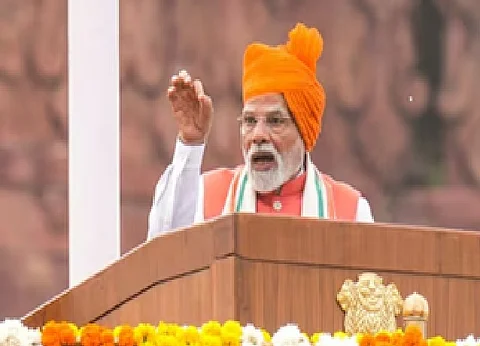

New Delhi | Prime Minister Narendra Modi on Friday announced a project to develop an indigenous air-defence system to protect India's vital military and civilian installations and deliver a decisive response to any enemy threat, a move that came amid concerns over security challenges emanating from Pakistan and China.
In his Independence-Day address from the ramparts of the Red Fort here, Modi also hinted at New Delhi's resolve to reduce dependence on foreign technologies for military platforms as he called for the development of jet engines within the country for India's fighter aircraft.
Though the prime minister did not elaborate on the air-defence system named "Sudarshan Chakra", experts said it could be on the lines of Israel's Iron Dome all-weather air-defence system, known as a very effective missile shield.
The announcement on the new defence system came days after Pakistan Army chief Field Marshal Asim Munir reportedly hinted at targeting Indian assets along the border, including Reliance Industries Limited's Jamnagar refinery in Gujarat, in case of any future military confrontation between the two neighbouring countries.
Announcing the launch of "Mission Sudarshan Chakra", Modi said it will be aimed at neutralising enemy threat and enhancing India's offensive capabilities.
The prime minister linked the mission to Krishna's Sudarshan Chakra, highlighting how India draws inspiration from its rich cultural and mythological heritage to guide modern defence innovations.
The mission underscores India's commitment to strategic autonomy, ensuring rapid, precise and powerful responses to any threat, he said.
The prime minister urged Indian innovators and youngsters to develop jet engines within the country, ensuring that future defence technology is entirely home-grown and self-reliant.
Modi's emphasis on developing an indigenous jet engine also assumes significance as it came amid some hitch in sealing a deal between Hindustan Aeronautics Limited (HAL) and US defence major GE Aerospace to jointly produce a jet engine to power the next generation of India's combat aircraft.
GE Aerospace has also missed deadlines in supplying its jet engines to HAL that subsequently caused delays in the Indian aerospace company's delivery of Tejas combat jets to the Indian Air Force.
India had launched a project around 35 years back to develop a jet engine for indigenously-built aircraft. However, the Kaveri engine project is yet to be completed.
The engine project was approved by the Cabinet Committee on Security in 1989 and was primarily rolled out for India's Light Combat Aircraft (LCA) programme.
An amount of Rs 2,035 crore has already been spent on the project.
In his remarks, Modi hailed Operation Sindoor, launched in the aftermath of the April 22 Pahalgam attack to target terror infrastructure in Pakistan and Pakistan-occupied Kashmir (PoK), as a demonstration of India's self-reliance in defence.
He noted that indigenous capabilities, including Made-in-India weapons, enabled the country to act decisively and independently, proving that national security cannot rely on foreign dependence.
